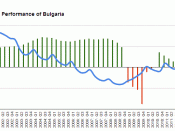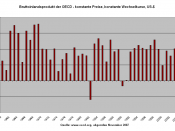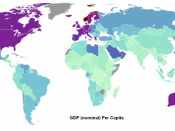The study of economic helps ones to understand why one would choose an alternative over another. How does one arrive to that decision? What factors are involved? What does this mean to the individual and society? These questions can easily answer by explaining some basic principles of economics. This paper will attempt to define such terms as Gross Domestic Product (GDP), Real GDP, unemployment rate, inflation rate, and interest rate to help one better understand some key concepts of economics.
Gross Domestic Product (GDP)The official measure of total output of goods and services in an economy is known as the gross domestic product (GDP). The monetary value of all the finished goods and services produced within a country's borders in a specific time period, though GDP is usually calculated on an annual basis. It includes all of private and public consumption, government outlays, investments and exports less imports that occur within a defined territory.
GDP is commonly used as an indicator of the economic health of a country, as well as to gauge a country's standard of living. Critics of using GDP as an economic measure say the statistic does not take into account the underground economy - transactions that, for whatever reason, are not reported to the government. Others say that GDP is not intended to gauge material well-being, but serves as a measure of a nation's productivity, which is unrelated.
Real GDPThis inflation adjusted measures that reflect the value of goods and services produced in a given year (Colander, 2004). Unlike GDP, real GDP can report for changes in the price level which will provide a more accurate data.
Unemployment RateUnemployment is very closely related to the business cycle. As well as experiencing fluctuations in unemployment, most countries have experienced an increase in average unemployment rates from...



Ok
It was good but could have been better
0 out of 0 people found this comment useful.